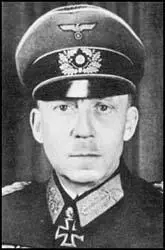Gotthard Heinrici

Gotthard Heinrici was born in Gumbinnen, Germany, on 25th December, 1886. He joined the German Army in 1906 and during the First World War served on both the Western Front and the Eastern Front.
After the war Heinrici remained in the army and in 1936 was promoted to the rank of Major General. During the Western Offensive Heinrici commanded the 12th Corps and managed to break through the Maginot Line on 14th June 1940.
Heinrici took part in Operation Barbarossa in the Soviet Union and while serving under Heinz Guderian in the 2nd Panzer Army was awarded the Iron Cross.
Promoted to the rank of General in January 1942, Heinrici was given command of the 4th Army. Over the next two years he developed successful defensive strategies against the Red Army. This included withdrawing and then counterattacking advancing forces.
In August 1944 Heinrici was appointed commander of the 1st Panzer Army. In March 1945, Heinrici succeeded Heinrich Himmler as Army Group Vistula. When Heinrici rejected Hitler's command to hold Berlin at all costs he was relieved of his command on 28th April 1945. Gotthard Heinrici died on 13th December 1971.
Primary Sources
(1) Albert Speer, Inside the Third Reich (1970)
The assault on Berlin was imminent. Hitler had already appointed General Reymann to be commandant of the city for the battle. At first Reymann remained subordinate to General Heinrici, the Commander in Chief of the army group which extended from the Baltic Sea along the Oder River to about sixty miles south of Frankfurt an der Oder.
Heinrici was a man I trusted, for I had known him a long time and only recently he had helped me to surrender the industry of the Rybnicker coal basin intact. So when Reymann insisted on preparing every bridge in Berlin for demolition, I drove to Heinrici's headquarters near Prenzlau. That was on April 15, one day before the beginning of the great Russian offensive against Berlin. For technical reinforcement I brought with me the Berlin municipal superintendent of roads. Langer, and the Berlin chief of the Reichsbahn, Beck. At my request Heinrici ordered Reymann to attend the conference.
The two technicians demonstrated that the planned demolitions would mean the death of Berlin. The commandant of the city referred to Hitler's orders to defend Berlin by every possible expedient. "I must fight, and therefore I must be able to destroy bridges."
"But only in the direction of the main blow?" Heinrici interjected.
"No. wherever there is fighting," General Reymann said.
I asked whether all the bridges in the center of the city were also to be destroyed if the fighting came down to street battles. Reymann said yes. This was the moment for some platonic reasoning. I had it down to a pattern by now. "Are you going to fight because you believe in victory?" I asked.
The general was taken aback for a moment; then he had no choice but to answer this question affirmatively.
"If Berlin is thoroughly destroyed," I said, "then industry will be wiped out for the foreseeable future. And without industry the war is lost"
General Reymann was in a quandary. He did not know what to do. Fortunately. General Heinrici came to the rescue with specific orders. The explosives were to be removed from the blasting charges on the vital arteries of the Berlin railroad and highway network. Bridges would be blown up only in the actual course of important military actions.
